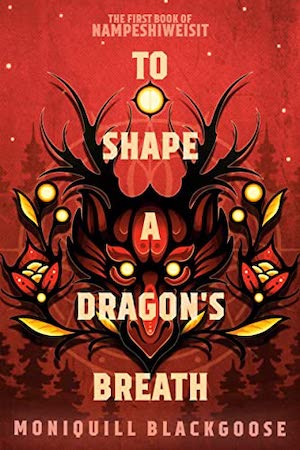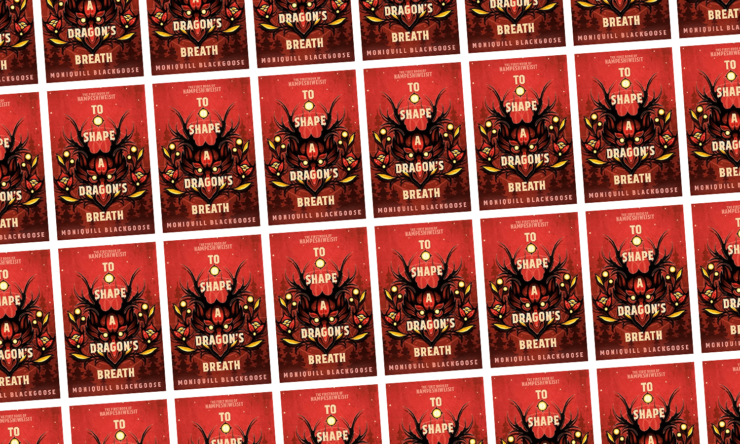Anequs’ people, the Masquisit, have lived on their island long enough to have known the world before the Anglish arrived, survived the diseases and theft and massacres the colonizers brought with them, and the industrialization that now creeps at the edges of what’s left of their lands. Ostensibly, they are under Anglish rule, but unlike their neighbors on nearby islands, they’ve so far been left mostly to their own devices. That all ends when Anequs encounters a dragon egg left behind by a forlorn Nampeshiwe. When the egg hatches and Kasaqua is born, Anequs bonds with her and becomes Nampeshiweisit. And with that, her entire life changes in an instant.
At the academy, Anequs confronts a tidal wave of racism and sexism, all wrapped in a colonization bow, from nearly every quarter. By some she’s looked down on as vermin whose people should be exterminated, and by others she’s merely a pathetic nuisance and any effort to educate her is a waste of time. A few look kindly upon her, but even that gaze carries with it a threat of wanting to civilize her out of her savage nackie ways (“nackie” is the common term for Indigenous people) to become a respectable member of Anglish society. For them, Anequs is a social experiment. Can the nackies be bettered? As noble as Kupier and those like her think their ideals are, they’re really nothing more than acting out the famous quote from Richard Henry Pratt (the man who founded the Carlisle Indian School): “Kill the Indian in him, and save the man.”
Buy the Book


To Shae a Dragon’s Breath
Anequs is wholly uninterested in any of those three situations, and repeatedly pushes back against all attempts to demean, dismiss, or “de-nackie” her. She is there for one reason and one reason only: Kasaqua. The Anglish version of Nampeshiweisit is “dragoneer”, but to them the relationship is one of dominance and labor. To them, the dragon is more like a horse than a revered creature of great power. It’s a weapon and a tool, a mode of transport and a threat of violence. Dragoneers feel a bond with their dragons, but it isn’t as profound or as mutual as what Anequs feels toward Kasaqua. For her, their relationship is of partnership and mutual benefit.
The Anglish require all dragons and dragoneers to be verified and registered. The profession is highly regulated, and any misstep or perceived misstep results in immediate retribution. As much as Anequs wants to live an Anglish-free life, she’s forced to bring Kasaqua to one of their busy, filthy cities and enroll in a dragon-training school. If she fails out of her several years of classes at Karina Kuiper’s Academy of Natural Philosophy and Skiltakraft—or if she’s expelled, whether reasonable or due to racist outside forces—Kasaqua will be forcibly taken from her and put to death. Using her own lens of Indigeneity, Blackgoose explores what it’s like for Anequs to try and retain her culture while also having to adapt to Anglish rules. How much of herself will she have to sacrifice in order to get the stamp of approval she needs to escape Anglish society? How much of herself will she be able to get back? Will she end up like her brother, who left home and settled in the industrial part of the city where he hopes to bring technology and modernization back to his people? Or will she end up like Theod?
Theod is the only other nackie at the school. He came to his dragon, Copper, in a way that makes the Anglish despise him. Where Anequs grew up immersed in her culture and surrounded by her people, Theod doesn’t even know his true name. His parents were killed during a nackie rebellion, and Theod carries the shame and guilt of their violence against the Anglish like a millstone around his neck. The Anglish taught him to hate the nackie part of himself, but also taught him to hate that he can never be truly Anglish. No matter how much he bends and bends, they will never be satisfied. They want him to break so they can punish him for breaking.
The longer she’s at Kuiper’s Academy, the more Anequs realizes just how bad Anglish patriarchy and white supremacy is for everyone, including the Anglish. Liberty is technically an indentured servant, but her indenture is much closer to enslavement. There are few Black people in Vastergot, the metropolis on the mainland, and she’s the only one at the Academy. Her friendship and tentative romance with Anequs is one of the many highlights of the novel. Moniquill Blackgoose doesn’t dive very deeply into anti-Black racism, but there are enough threads there that I expect future installments will have a lot more to say.
Although Anequs is fifteen years old, this is definitely not a young adult novel. She’s quite clear throughout the story that according to her cultural practices she’s an adult. That tension between childhood and adulthood is an ongoing one, with the Anglish constantly trying to devalue her as a child and her insisting she’s an adult capable of making her own decisions. This isn’t written like YA, teens aren’t the target audience, and, coming from a critic who reads extensively in young adult speculative fiction, it certainly doesn’t feel like a YA story.
I split my reading time with this as half in print and half on audiobook. The narrator, Charley Flyte, was fantastic. The little things in particular struck me, like how Flyte intentionally mispronounced Anequs’ name as “ANNA-kiss” when doing the white characters (reflecting how they constantly butcher her name) and pronounced it correctly as “ah-neh-KOOS” when doing the nackie characters. The story interstitials especially were handled so beautifully that I went back to listen to the ones I read in print because I wanted to hear Flyte tell me the stories. Sometimes you get an audiobook that sounds like the narrator is reading a script, and sometimes it sounds like someone reading a bedtime story. Flyte was very much the latter, and I kept feeling like a kid begging for just one more chapter before bedtime.
With a vivid imagination and crackling craft, Moniquill Blackgoose’s To Shape a Dragon’s Breath is, well, a breath of fresh air. It’s fiery, propulsive, and wonderfully unique. She’s built a world I can’t wait to revisit and populated it with characters I’m thoroughly invested in. I’m calling it now: this book is going to be all over the end-of-year Best Of lists and award nominations.
To Shape a Dragon’s Breath is published by Del Rey.
Alex Brown is a Hugo-nominated and Ignyte award-winning critic who writes about speculative fiction, librarianship, and Black history. Find them on twitter (@QueenOfRats), instagram (@bookjockeyalex), and their blog (bookjockeyalex.com).










